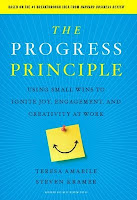Coert Visser, Juli 1, 2012 In 2011, Teresa Amabile, a professor of Business Administration at Harvard Business School and Steven Kramer, a developmental psychologist published the book The Progress Principle: Using Small Wins to Ignite Joy, Engagement, and Creativity at Work which is one of the most compelling cases yet for focusing on progress in work. In the book they report on a large scale study into worker performance and motivation. One thing Amabile and Kramer did was to survey more than 600 managers from dozens of companies, asking them to rank the impact on employee motivation and emotions of five workplace factors: recognition for good work, incentives, interpersonal support, making progress and clear goals. The majority of these managers, chose “recognition for good work”. But a multiyear study which tracked day-to-day activities of 238 people in 26 project teams in 7 companies in 3 industries showed that these managers were not right about this. The study exami











